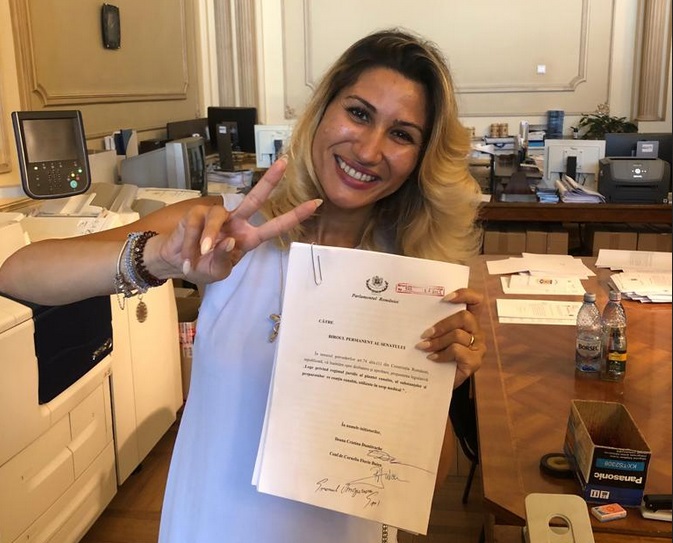
The question of legalizing cannabis for medical purposes in Romania, as a pain reliever for terminally ill patients, was taken out of the box and discussed on Monday evening in the Health Committee of the Chamber of Deputies after almost 4 years of impasse. The most resistance and the most silence came from the representative of the Ministry of Health – one of the honorary advisers Alexander Rafila – who was persistently asked why the institution opposes “if all over Europe medical cannabis is on all billboards.” Instead, George Simion announced that the AUR supported the bill and promised that if his party entered the government, medical cannabis would be legalized in Romania.
Less than 10% of Romanian patients in need of palliative care have access to it. A law that would give them access to cannabis-based painkillers has been in the drawer for 3 1/2 years
Palliative care is the least used and represented segment of medicine in Romania, less than 10% of patients who need palliative care have access to it in our country, Adrian Wiener, USR deputy and hospital doctor, explained during the Arad County debate.
“There are countries where there are no palliative care centers. In Romania, people are dying in a barbaric way,” Adrian Wiener stressed.
He admitted that “the patients were looking at us doctors and we had no solution.”
The bill, which gives terminally ill patients access to cannabis-based painkillers, was submitted to parliament almost 4 years ago, in the summer of 2019. It envisions that terminally ill patients will have access to cannabis for the first time. painkillers according to a specialist’s prescription, using a special form (as in the case of morphine). After the rapid passage of the Senate (in November 2019), the draft law languished in the drawers of the specialized committees of the Chamber of Deputies (the decision-making body) for 3 years and 4 months.
The bill is now awaiting a joint report from the Health, Defense and Agriculture Committees before it can go to a plenary vote.
The draft law, submitted 3 years ago to the parliament, in fact, provides for the possibility to prescribe by a specialist doctor sedatives containing cannabis, in the form of oil, tincture, infusion or for inhalation. The bill explicitly states that smoking cannabis is prohibited.
The bill, which envisages the legalization of medical cannabis as an analgesic for patients in the terminal phase, was initiated by Christina Dumitrake (PSD MP, former member of the Health Committee of the Chamber of Deputies) and Emanuel Ungurianu (USR MP, Vice President). Committee on Health Care of the Chamber of Deputies) and collected the signatures of 85 parliamentarians from all parliamentary parties – PSD, Pro Romania, USR, PNL and ALDE.
In addition, during the debate on Monday evening in the Health Committee, Emanuel Ungurianu emphasized that “we are not in the zone of political rivalry, including the AUR (which entered the parliament after submitting a legislative initiative – ed.) supports the adoption of this draft law”.
On the other hand, AUR President George Simion attended the debate, although he is not a member of the Health Committee, to announce that AUR supports the adoption of the bill and if his party reaches the government, medical cannabis will be legalized in Romania.
“My mother left me a moral will to help other patients”
The bill started with Alexandra Ana Carstea, a young woman whose mother, Victoria, died of cancer in early 2019. In memory of her mother, Oleksandra named the bill “Victoria” and is fighting to ensure that other terminally ill cancer patients have access to cannabis-based pain relievers. During these years, she became the main voice for the legalization of medicinal cannabis in Romania.
Oleksandra initiated a petition that collected tens of thousands of signatures, and then she was able to push through the parliament a bill on the legalization of medical cannabis, which was signed by almost 100 deputies from all parties.
All this time, Oleksandra has been the main voice of efforts to legalize cannabis for medical purposes in Romania. She started the legalization of medical cannabis in Romania because her mother was alive and needed such painkillers.
“I wanted until the last moment of my mother’s life to have access to such legal treatment as in other EU countries. This law is a moral testament that my mother left to me to help other patients,” Aleksandra Karstya testified on Monday during a debate in the Health Care Committee of the Chamber of Deputies.
“I could see the results with my own eyes from my mother, who received medicinal cannabis under medical supervision,” Oleksandra Karstya also said.

Alexandra Ana Karstya and Victoria Bill
“Think how much suffering you’ll save if this law gets passed sooner!”
One of the law’s big supporters from civil society is Liviu Mihaiu, who spoke during Monday’s debate about “meteahnă, a kind of administrative cancer of the Romanian state — if we don’t control this phenomenon, we’d better ban it.”
Liviu Mihaiu was the one who challenged several times during the debate the representative of the Ministry of Health – psychiatrist Gabriel Diakon, honorary advisor to the minister Alexander Rafil – to explain why the institution does not support the adoption of this bill without receiving a clear explanation. answer.
In the end, Liviu Mihaiu obtained a promise from Gabriel Diakonu that the Ministry of Health could support the project after making its own amendments.
“Take the report of the presidential commission (from 2009 – ed.), which took all the research in the world and recommended decriminalizing (drug use – ed.). Only in Belarus there is still such a law to send child consumers to prison. Why does the Ministry of Health oppose it, when all over Europe medical cannabis is on all billboards? This plant has been eaten for 10,000 years. Leave the political rivalry! Think about the patients! Think how much suffering you will save if this law is adopted sooner!” Liviu Mihaiu said at the meeting of the health care commission of the Chamber of Deputies.
Nelu Tetaru explains why he kept the law in the drawer until now: “I know what the pain of patients means. Let’s end it, but let’s do it in the legal field!”.
Nelu Tetaru (PNL), former Minister of Health and President of the Health Commission in the Chamber of Deputies, says that as a doctor he knows “what pain means” and wants to “treat” patients’ pain: “We know what does pain mean let’s end it! But let’s do it in the legal field, so that the Constitutional Court doesn’t come later or I don’t know who else,” said Nelu Tetaru during the evening debate on Monday.
Nelu Tetaru has made it clear that he supports the passage of the bill, even though he has kept it in a drawer for years, but first he wants to clarify some aspects of the bill so that it cannot be attacked once approved.
Nelu Tetaru referred to Art. 1 of the draft law, which states that “this law establishes a legal regime for the cultivation, production, manufacture, storage, trade, distribution, transportation, possession, offer, transfer, mediation, acquisition, use and transit on the national territory, for medicinal purposes of plants hemp and substances made on the basis of these plants”.
For his part, Florin Buicu (PSD), vice-president of the Health Commission in the Chamber of Deputies, states that the draft law “is not only about the medical use of cannabis. We are waiting for answers from the institutions of the Romanian state regarding the other provisions – cultivation, production, production, storage, trade, distribution, transportation, possession, offer, transfer, mediation, acquisition, use and transit in the national territory. . For all others, we are waiting for answers from state institutions. We want to know the answers, so that the parliamentarians, knowing the case, can exercise their vote.”
On the other hand, MP Cristina Dumitrake (PSD), the initiator of the bill, believes that she wanted Romania “not to be a simple outlet. We can offer our patients quality products.”
“Out of desperation, our patients either commit illegal acts or cross the border,” warned Cristina Dumitrache.
With the bill awaiting a joint report from the Health, Defense and Agriculture Committees to be able to vote in plenary, Christina Dumitrake urged her colleagues to “stop being afraid, at least here in Parliament!”

The Ministry of Health is represented by Gabriel Diacona, Honorary Advisor to Minister Rafila. The deacon hesitated between “the ministry does not support” and “will support, but with its own amendments”
The Ministry of Health was represented at the parliamentary debate by Gabriele Diaconu, psychiatrist and Honorary Advisor to Alexandra Rafila, and Camelia Bunaciou, representative of the Ministry of Health’s Medicines and Medical Devices Policy Office.
Of the two, only Gabriel Diaconu spoke during the debate in the Health Committee. Diaconu began by announcing that the Ministry of Health does not support the bill, and in his first speech invited the doctors present in the room “to say if any of you have recommended marijuana for medical use” and then urged those present “to distinguish truth from fiction”.
Urgently invited several times, including by the President of the Health Commission, Nelu Tetaru, to explain the reasons why the institution under the leadership of Alexandru Rafila does not support the draft law, Diakonu was unable to explain them clearly, and ended by promising that the Ministry of Health could to support the project, subject to the introduction of own amendments.
MAI does not support the bill. DIICOT: There will be associated crime
President of the National Medicines Agency, Rezvan Prisada, who was present at the debate, said that the topic of the use of cannabis for medical purposes is also relevant at the level of the European Medicines Agency.
Prisada also says that such drugs – two officially approved at the level of the European Union – can currently be brought to Romania for special needs for patients, but the National Medicines Agency has not yet had such requests.
A representative of the National Agency for Combating Narcotics, subordinate to the Ministry of Internal Affairs, who was present at the debate, said that the MAI does not support the adoption of the draft law.
In addition, the head of DIICOT’s anti-trafficking department noted that currently in Romania, the consumption of cannabis is a crime, and this law will bring decriminalization in the medical segment: “Regarding the consumption of cannabis, we follow European standards. The segment you are targeting is medical, and it is small in volume. In Romania, there are less than 10% penalties for consumption, and it depends on the criminal record.”
The head of DIICOT’s anti-trafficking unit called on health commission members to take into account the fact that under current legislation there would be “criminality associated” with the possible legalization of medicinal cannabis: “THC, the active substance, is very high in of blood – I mean drunk driving, etc.”
Source: Hot News
Ashley Bailey is a talented author and journalist known for her writing on trending topics. Currently working at 247 news reel, she brings readers fresh perspectives on current issues. With her well-researched and thought-provoking articles, she captures the zeitgeist and stays ahead of the latest trends. Ashley’s writing is a must-read for anyone interested in staying up-to-date with the latest developments.